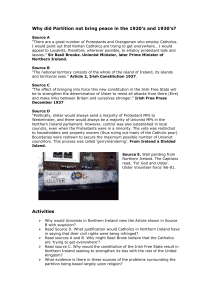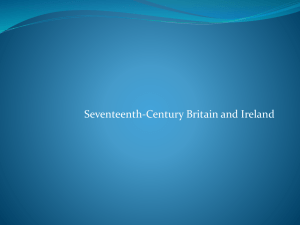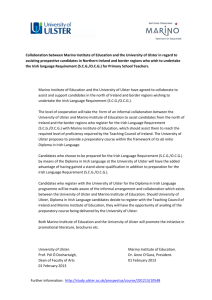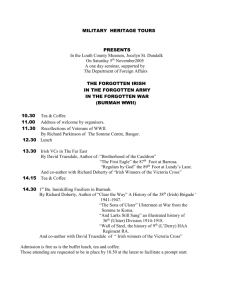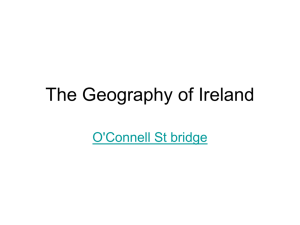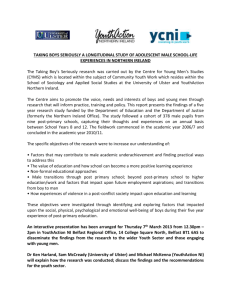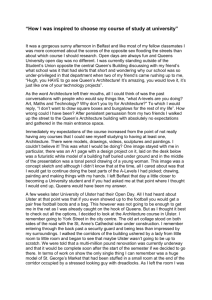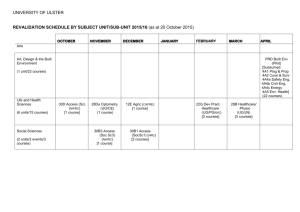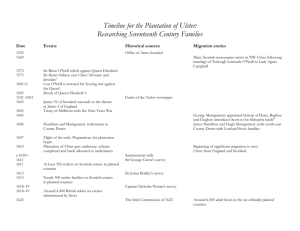Bibliography for Eighteenth Century Irish Migration
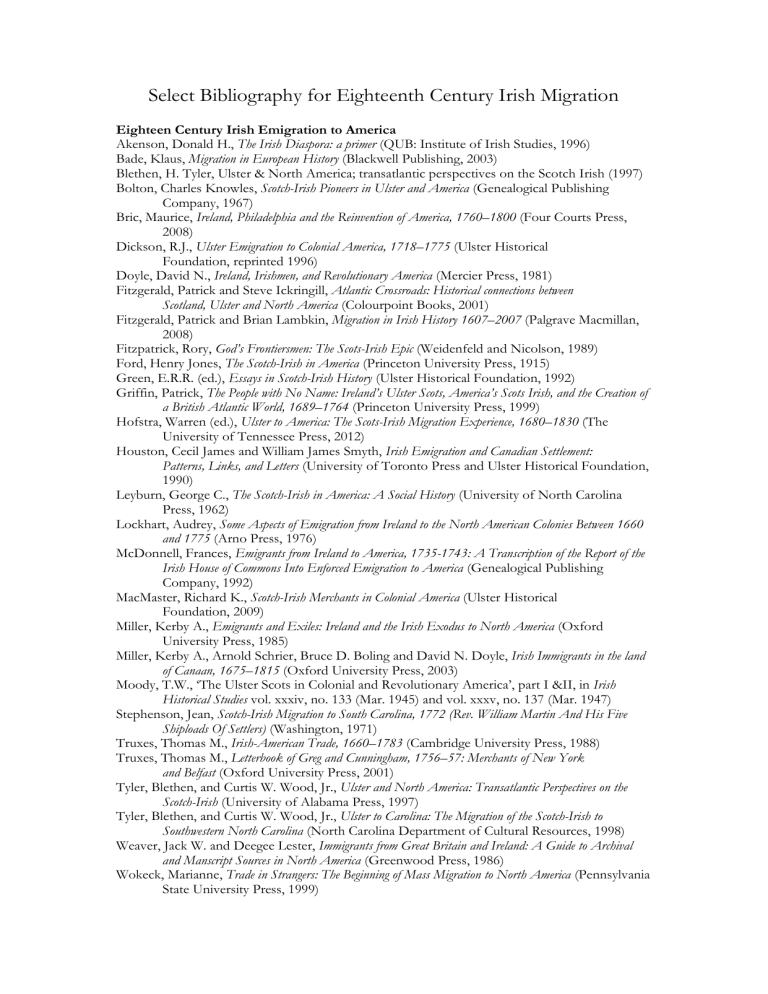
Select Bibliography for Eighteenth Century Irish Migration
Eighteen Century Irish Emigration to America
Akenson, Donald H., The Irish Diaspora: a primer (QUB: Institute of Irish Studies, 1996)
Bade, Klaus, Migration in European History (Blackwell Publishing, 2003)
Blethen, H. Tyler, Ulster & North America; transatlantic perspectives on the Scotch Irish (1997)
Bolton, Charles Knowles, Scotch-Irish Pioneers in Ulster and America (Genealogical Publishing
Company, 1967)
Bric, Maurice, Ireland, Philadelphia and the Reinvention of America, 1760–1800 (Four Courts Press,
2008)
Dickson, R.J., Ulster Emigration to Colonial America, 1718–1775 (Ulster Historical
Foundation, reprinted 1996)
Doyle, David N., Ireland, Irishmen, and Revolutionary America (Mercier Press, 1981)
Fitzgerald, Patrick and Steve Ickringill, Atlantic Crossroads: Historical connections between
Scotland, Ulster and North America (Colourpoint Books, 2001)
Fitzgerald, Patrick and Brian Lambkin, Migration in Irish History 1607–2007 (Palgrave Macmillan,
2008)
Fitzpatrick, Rory, God’s Frontiersmen: The Scots-Irish Epic (Weidenfeld and Nicolson, 1989)
Ford, Henry Jones, The Scotch-Irish in America (Princeton University Press, 1915)
Green, E.R.R. (ed.), Essays in Scotch-Irish History (Ulster Historical Foundation, 1992)
Griffin, Patrick, The People with No Name: Ireland’s Ulster Scots, America’s Scots Irish, and the Creation of
a British Atlantic World, 1689–1764 (Princeton University Press, 1999)
Hofstra, Warren (ed.), Ulster to America: The Scots-Irish Migration Experience, 1680–1830 (The
University of Tennessee Press, 2012)
Houston, Cecil James and William James Smyth, Irish Emigration and Canadian Settlement:
Patterns, Links, and Letters (University of Toronto Press and Ulster Historical Foundation,
1990)
Leyburn, George C., The Scotch-Irish in America: A Social History (University of North Carolina
Press, 1962)
Lockhart, Audrey, Some Aspects of Emigration from Ireland to the North American Colonies Between 1660
and 1775 (Arno Press, 1976)
McDonnell, Frances, Emigrants from Ireland to America, 1735-1743: A Transcription of the Report of the
Irish House of Commons Into Enforced Emigration to America (Genealogical Publishing
Company, 1992)
MacMaster, Richard K., Scotch-Irish Merchants in Colonial America (Ulster Historical
Foundation, 2009)
Miller, Kerby A., Emigrants and Exiles: Ireland and the Irish Exodus to North America (Oxford
University Press, 1985)
Miller, Kerby A., Arnold Schrier, Bruce D. Boling and David N. Doyle, Irish Immigrants in the land
of Canaan, 1675–1815 (Oxford University Press, 2003)
Moody, T.W., ‘The Ulster Scots in Colonial and Revolutionary America’, part I &II, in Irish
Historical Studies vol. xxxiv, no. 133 (Mar. 1945) and vol. xxxv, no. 137 (Mar. 1947)
Stephenson, Jean, Scotch-Irish Migration to South Carolina, 1772 (Rev. William Martin And His Five
Shiploads Of Settlers) (Washington, 1971)
Truxes, Thomas M., Irish-American Trade, 1660–1783 (Cambridge University Press, 1988)
Truxes, Thomas M., Letterbook of Greg and Cunningham, 1756–57: Merchants of New York
and Belfast (Oxford University Press, 2001)
Tyler, Blethen, and Curtis W. Wood, Jr., Ulster and North America: Transatlantic Perspectives on the
Scotch-Irish (University of Alabama Press, 1997)
Tyler, Blethen, and Curtis W. Wood, Jr., Ulster to Carolina: The Migration of the Scotch-Irish to
Southwestern North Carolina (North Carolina Department of Cultural Resources, 1998)
Weaver, Jack W. and Deegee Lester, Immigrants from Great Britain and Ireland: A Guide to Archival
and Manscript Sources in North America (Greenwood Press, 1986)
Wokeck, Marianne, Trade in Strangers: The Beginning of Mass Migration to North America (Pennsylvania
State University Press, 1999)
Other resources and websites
The Scots in Ulster: Surname Map and Pocket History (Ulster Historical Foundation, Ulster-Scots
Agency and Tourism Ireland, 2008) www.ancestryireland.com/scotsinulster/ www.ulstervirginia.com www.1718migration.org.uk/s_home.asp
Booklets (Ulster Scots Community Network)
Note: All of these USCN titles can be downloaded free of charge as PDF files from the Ulster-
Scots Community Network: www.ulster-scots.com/publications
The Ulster-Scots and New England: Scotch-Irish foundations in the New World
Ulster and Canada: Ulster-Scots and the making of modern Canada
Ulster and Pennsylvania: Ulster-Scots and ‘the Keystone State’
Ulster and Tennessee: The Ulster-Scots contribution to the making of ‘the Volunteer State’
When Ulster Sailed West: The Ulster-Scots contribution to the making of the United States
Populist/biographies
McReynolds, Alister, Kith and Kin: The Continuing Legacy of the Scotch-Irish in America (Colourpoint
Books, 2013)
McReynolds, Alister, Legacy: The Scots Irish in America (Ambassador Publications, 2009)
Articles published in
Familia: Ulster Genealogical Review
Note: All of the articles published in Familia: Ulster Genealogical Review from 1985 to 2013 can be accessed free of charge by members of the Ulster Genealogical and Historical Guild. To enjoy the many benefits of Guild membership go to: www.ancestryireland.com/membership/
Familia, no. 4 (1988)
The Geography of the Irish Emigration to Canada (C.J. Houston and W.J. Smith)
Captain Alexander Chesney: A Loyalist during the American Revolution (Eileen Black)
The Phillips families of Ulster and South Carolina (Frank Phillips)
Familia, no. 8 (1992)
Reconstructing an immigrant family from United States’ records (Edward J. O’Day)
Irish Emigration to Canada: the directive role of William Hutton (C.J. Houston and W.J. Smyth)
Familia, no. 10 (1994)
The Scottish and Irish background of the Rev. Hugh Conn of the colonial clergy of Maryland (W.
Clarke Conn)
The Caldwells of Quebec (John Cunningham)
Familia, no. 11 (1995)
The Scots in Ulster: their denization and naturalisation, 1605–34 (David Stewart)
Familia, no. 12 (1996)
Emigrants from Ulster in Prince Edward Island, 1770–1790 (Richard K. MacMaster)
History as Destiny in the James Steel Family, from Co. Monaghan to Westmoreland County
(Walanne P. Steel)
Shirlings in Scotland, Ulster and America (Hugh and Julia Mullin)
Familia, no. 13 (1997)
Reflections on family history: the musings of an irreverent colonial (Katharine L. Brown)
Familia, no. 14 (1998)
The James Bones Family Circle: a United Irishman’s southern American heritage (Katharine L.
Brown)
Familia, no. 16 (2000)
The many faces of the Scotch-Irish (Michael Montgomery)
Sergeant Edward McGuckin: an Irish casualty in the American Civil War (John H. McGuckin, Jr.)
Familia, no. 17 (2001)
James Fulton: a Philadelphia merchant and his customers (Richard K. MacMaster)
Familia, no. 18 (2002)
Family and Servants: critical links in the eighteenth-century immigration chain to the Delaware
Valley (Marianne Wokeck)
Fanning the flames of Revolution from the Presbyterian pulpit: John Glendy, Irish and American
Revolutionary (Nancy Sorrells)
William Martin, Covenanter preacher and revolutionary patriot, 1729–1807 (Heather South)
Scottish Emigration to Colonial America: an overview (David Dobson)
Familia, no. 20 (2004)
From Emigrant Exiles to Immigrant Gentiles? Kerby Miller on the Irish in North America, 1985–
2003 (David Fitzpatrick)
The Moores of Londonderry and Baltimore: a study in Scotch-Irish eighteenth century migration
(Richard Moore-Colyer)
‘It would be easy enough if there was no ocean’: tracing the evolution of the Atlantic voyage in the nineteenth century (Christine McIvor)
The Voyage of the Nancy 1767 (Richard K MacMaster)
Ulster Presbyterian emigration to America: the absence of a Unionist political dimension in America
(Elodie Aviotte)
Familia, no. 20 (2004)
Nomenclature for Ulster emigrants and their descendants: Scotch-Irish or Scots-Irish? (Michael
Montgomery)
Familia, no. 21 (2005)
‘If they would come to America’: inheritance as a form of chain migration (Peter Gilmore)
Medicine as cultural baggage in the Ulster-Scots settlements of the Valley of Virginia (Kenneth W.
Keller)
From the north of Ireland to the North River of the Shenandoah: James and Margaret Ramsey, an
Ulster Scot farming family in Augusta County, Virginia (Lee K. Ramsey)
Familia, no. 22 (2006)
Mapping the Ulster diaspora 1607–1960 (Patrick Fitzgerald)
Where the Twain meet: an account of Samuel Langhorne Clemen’s Ulster Connection (Doreen
McBride)
‘For Philadelphia, Boys, Are We Bound’: the Rev. Joseph Rhea comes to America in 1769
Familia, no. 23 (2007)
Passenger Lists and other references to Irish immigrants from early Wilmington, New Castle County,
Delaware newspapers (Gary Hawbaker)
Familia, no. 24 (2008)
Emigration and Education in post-Famine Co. Londonderry: the case of the McCloskey family
(Mary Wack)
‘Not Been Heard of Since’: insights into Ulster Family Emigration post-1880 (Paul Richmond)
Familia, no. 25 (2009)
A view from the eastern shore of the Atlantic – another way to look at emigration (Linde Lunney)
Familia, no. 26 (2010)
The Scottish and Irish backgrounds of a ‘Scotch-Irish’ family: The Mellons of Castletown,
Tyrone and Pittsburgh, Pennsylvania (Brian Lambkin)
Familia, no. 27 (2011)
The cotton famine – Old Hickory and the Mary Edson, emigrant ships for America in 1863 (F.
Gilbert Watson)
Familia, no. 29 (2013)
Home and Leaving Home in Eighteenth Century Ulster (Linde Lunney)
A Fine Old Tune in a Different Key: Problems and Progress in the Study of the ‘Scotch-Irish’ in Ireland and America (review article) (Rankin S. Sherling)
Familia, no. 30 (2014)
Aghadowey, Rev. James McGregor and the 1718 Emigration: Local Causes, Local Effects (Linde
Lunney)
Some Terminology
Indentured Servant
An indentured servant was an immigrant who worked in servitude in the ‘New World’ to pay their passage, at the end of which they often received a minimum start capital and/or a piece of land. Indentured servitude could be viewed as a form of temporary slave labour. It was not identical to slavery, because the employer owned only the labour of the contractual partner for a set period of time, and not the person outright. Most indentured servants remained in the country after working off their debt and became de facto immigrants, due to the fact that the system was generally a one-way ticket overseas. Transported convicts/prisoners, and redemptioners (see below) who were unable to come to adequate arrangements to pay off their passage, were often sold as indentured servants.
Drawn from Migration in European History by Klaus Bade
Redemptioner
Immigrants in the redemptioner system were also obliged to repay [as indentured servants were] the cost of their passage overseas through labour, either their own or their children’s. But at the end of the transatlantic voyage, they were no longer faced with arbitrary auctions where their labour contracts, and indirectly they themselves, were offered to the highest bidder.
Redemptioner servants, also called ‘free-willers’ to distinguish them from indentured servants, and deported prisoners, were instead given about two weeks after arriving on-board to negotiate with employers or their agents a way to repay their debt, either by drawing up a work contract of their choice, having the debt paid off by a guarantor, or seeking help from friends and relatives.
However the willingness or material means of relatives or friends to pay off the redemptioners’ debts or to vouch for them was often grossly overestimated. If no solution was negotiated within the time limit the contract dealer or captain could sell the redemptioner … as an indentured servant. … The redemptioner system was the means by which ordinary people could emigrate, that is, the proletarian and landless classes who had nothing to sell to finance their dreams except a few years of their labour and their lives.
Migration in European History by Klaus Bade, pp 84–5
Remittances
Money earned or acquired by immigrants that was sent back to their country of origin. This money was used to bring out other members of the family, in successive waves, a system often referred to as chain migration, or the monies might be used to support an impoverished family back home in Ireland.
Ulster Historical Foundation, 49 Malone Road, Belfast, Co. Antrim, BT9 6RY, Northern Ireland
Tel: +44 (0)28 9066 1988 Fax: +44 (0)28 9066 1977
E-mail: enquiry@uhf.org.uk
Web: www.ancestryireland.com
© 2015 Ulster Historical Foundation. All Rights Reserved.
